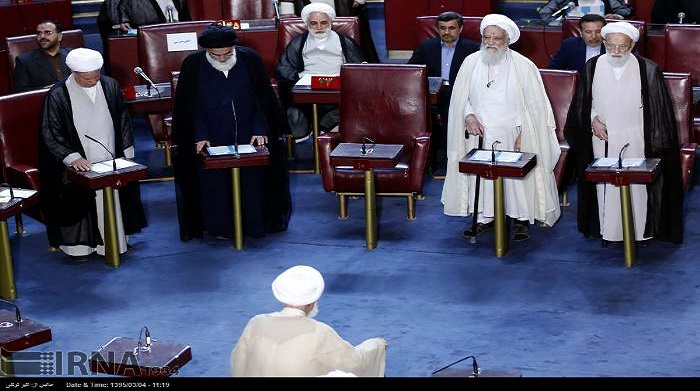Rafsanjani’s Vogue Soars among People, Plummets among Clerics

Jannati’s victory might sound surprising as he was on the verge of elimination during the public election where he finished sixteenth from the Tehran constituency. The 90-year-old, who found himself eligible for the election and then verified the ‘health’ of the marathon of the election he scarcely finished, was targeted in a campaign to block the so-called JYM trio, alongside Ayatollahs Yazdi and Mesbah, who failed to be elected at the end of the day. Hashemi Rafsanjani, allegedly behind the so-called English plot, had the highest number of ballots, excelling President Hassan Rouhani, with more than 2.3 million votes. However, despite his traditional leadership in the assembly, he did not run for the assembly’s chair, but backed Ayatollah Amini. Mostafa Danandeh explains in an article originally published in Asre-Iran why Hashemi is not the same political leader of the 1980s and 1990s for members of the assembly.
“Two of the most significant questions that come to mind after Ayatollah Jannati’s ascent to the chair of the Assembly of Experts are why Rafsanjani did not run and why the candidate affiliated with him did not come out as the victor. Considering the returns of the February 26 Assembly of Experts election and the people’s ballots bestowed on the list proposed by Hashemi Rafsanjani, why were the votes put in Ayatollah Jannati’s urn?
To answer these questions, two essential points should be taken into account. First, Rafsanjani had few like-minded candidates in the recent election. Many a religious and political figure affiliated with him such as Hassan Khomeini and Mousavi Bojnourdi were barred from the election and that is why Hashemi Rafsanjani was forced to put on-loan companions in his ‘experts of the nation’ list. His main objective was blocking certain political figures from the assembly, which was achieved through the ballots cast. In other words, Rafsanjani used his moderate opponents to expel his powerful opponents. The latter’s refusal to run for the chair indicates this very objective, as almost everyone knew that Ayatollah Movahedi Kermani or Dorri Najafabadi would move in line with Rafsanjani’s strategy in the next assembly.
The second thing to be noted is that Hashemi and his adherents should admit that he is not as welcome as he used to be among the seminaries and the scholars who have been elected to the Assembly of Experts. In an interview on Rafsanjani’s role in the assembly, Ayatollah Haeri Shirazi, a former member of the Assembly of Experts, had said: “Anyone who competed with Mr. Hashemi was defeated; Mr. Jannati or others joined, but they failed too. Mr. Mahdavi [Kani], too, was elected because Mr. Hashemi declined to run out of respect for him. Later, Mr. Mahdavi said Mr. Hashemi had delegated the post to him”.
What has happened that Rafsanjani himself loses the competition in the fourth assembly to Ayatollah Yazdi and the candidate associated with him in the fifth assembly loses to Ayatollah Jannati? It seems that the clerics of the Assembly of Experts are offended by Rafsanjani’s positions after the 2009 election and even believe he is not the former revolutionary he used to be.
Before 2009 and in 2007, Rafsanjani obtained 41 votes from the fifth assembly, overcoming Ayatollah Jannati’s 34 votes, and became the chairman. Also in 2008, Rafsanjani was reelected with 51 votes versus Ayatollah Yazdi’s 26.
Rafsanjani’s stances in recent years have distanced those who found him a perfect political leader and moved them toward his political rivals. The year 2009 was a turning point in Rafsanjani’s political life. He moved away from the principlist stream and approached reformism. Exclusion of Rafsanjani from the Society of Seminary Teachers’ list in the fifth Assembly of Experts election was a clear indication.”
Rafsanjani and President Rouhani have both officially expressed content with the line-up of the Assembly of Experts’ board of directors. Jannati’s chairmanship with a great margin has been interpreted as Rafsanjani’s bitter defeat and seen as a prelude for the election of the next parliament’s speaker, which would be between the reformist Mohammad Reza Aref and moderate principlist Ali Larijani.

